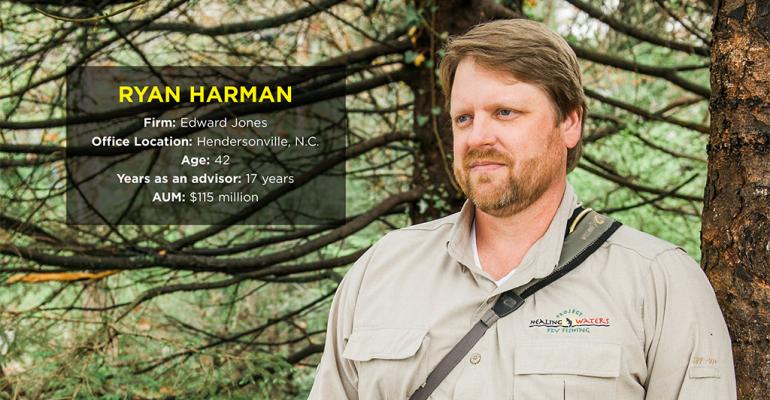Ryan Harman started fly-fishing as a teenager in the mountains of West Virginia, and continued to fish competitively after signing on as an advisor with Edward Jones. In 2006, he was invited to serve as a fly-fishing guide for Project Healing Waters, which at the time was a new rehabilitation program providing fishing classes, equipment and trips for disabled veterans at Walter Reed Medical Center.
He was immediately hooked. Harman grew up in a family of veterans, and Project Healing Waters gave him a way to use his hobby and his background in finance to work towards a cause he cares deeply about.
Harman started a Project Healing Waters chapter in Asheville, N.C., in 2007 and helped grow it into one of the largest and most well-funded chapters in the now-nationwide organization. After six years he was invited to join the national board, where he works with programs across the country on budgets, interactions with veterans, and training curriculums for volunteers and participants. As of 2013, there were 158 programs across 48 states.
Harman also helps Project Healing Waters with its quarterly fundraisers in Texas, Denver and New York City—in 2013, the group raised over $2 million—and organizing its national tournaments. In April, Project Healing Waters hosts its largest event, the 2-Fly Tournament, which brings fishermen, donors and veterans to Rose River Farm, a highly prized fly-fishing location in Virginia.
But at least one a month, Harman tries to get out on the water with the Asheville program and do some fishing.
“Really, that’s what it’s all about,” Harman said. “I have a chance to share something that’s been really important in my life with some truly deserving soldiers.”
Fly-fishing helps with physical rehabilitation—it aids hand-eye coordination, balance and stability for lower body issues; the repetitive motion enhances muscle skills; and hours spent in the calm tranquility of nature can help with emotional and mental healing.
“It’s not really about the fishing; it’s about putting a disabled vet in an environment where they have the opportunity to heal,” Harman said. “It gives them a great outlet to meet and talk about those issues, and be in an atmosphere where they feel like these are all people that know what [they’re] dealing with. It’s very conducive to the healing process.”





